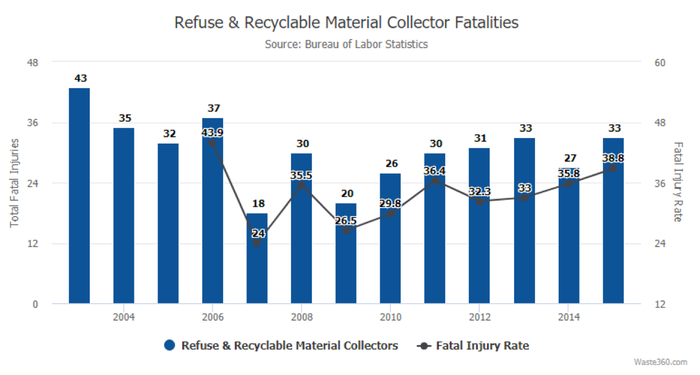Better SAFE Than SORRY
Video-based safety solutions improve safety and efficiency, and have a positive impact on the bottom line.
Sponsored Content
When it comes to today’s solid waste companies, transportation safety and efficiency are among the top concerns for fleet managers. Companies face a number of threats, and taking proactive steps to mitigate risks is vital to a company’s success. In the case of collisions, the impact extends well beyond physical damage to the vehicle. Often, accidents on the road result in legal setbacks and liability claims, damage to brand reputation, personal injury or worse, in addition to the cost to repair or replace fleet assets.
In 2015, total fatalities for refuse and recyclable material collectors rose from 27 to 33—matching 2013 for the greater number of fatalities since 2006. The fatal injury rate hit 38.8 per 100,000 workers—the highest level since 2006. According to analysis from the National Waste & Recycling Association, both private and public sector waste and recycling operations had 50 fatalities in 2015, up from 40 in 2014 and driven up mainly by fatalities at the landfill. The last time this number was 50 or higher was in 2008 when 54 fatalities occurred.

See the Big Picture
While solid waste fleets face many of the same types of challenges as other fleets, waste vehicles have their own unique challenges:
Garbage trucks make frequent and often unexpected stops to pick up waste. Drivers and cyclists around the truck may be in danger if these stops are made too quickly or without warning.
Trucks are large and, inherently, have many large blind spots. Each turn, back-up or stop is a potential accident.
Because garbage collection trucks must navigate through a complex network of city streets and back streets, they often find themselves in narrow alleyways where visibility and maneuverability are limited. If a driver fails to take proper precautions, an accident is likely.
Although garbage trucks are designed to keep waste contained in the truck, sometimes debris flies out. When heavy debris hits pedestrians or vehicles, or creates an obstruction in the road, it may cause serious injuries.
Today’s leading video-based driving analytics solutions offer fleets the ability to implement a road-facing camera only, road-facing and cab-facing cameras, or configure a solution of up to four cameras for 360-degree visibility around the vehicle. The most advanced solutions enable fleets to identify, score and analyze risky behaviors and actions, such as hard braking, speeding, following too closely to other vehicles on the road, U-turn detection and much more. Video capture initiates upon specific triggering events as determined by fleet management. Immediately following the incident, the video is saved and uploaded to a company-specific database, and analyzed by trained fleet safety experts.
The video serves as a single source of truth as to what actually occurred and allows fleet managers to identify specific risky behaviors. Video-based safety solutions have proven to be one of the most effective and game-changing methods of not only improving fleet safety practices, but improving relationships between managers and drivers as well. Fleet managers are then able to conduct targeted, personalized coaching for each driver based on the specific risky behaviors that may need to be addressed. This approach encourages open dialogue, ensures the focus is on safety improvement, and ultimately leads to enhanced driver performance, which reduces future risk and related costs.
Once drivers fully understand that video-based safety programs protect individual drivers as well as companies, any initial resistance generally subsides. One driver of a leading solid waste company stated, “At first you think the system is there to critique you, and point out your faults in your driving. But it’s not there for that purpose. It’s there to help us be a better, safer, company. It makes me feel a lot more secure and has made me a better driver.”
Relying on advanced driving analytics, the best video-based systems provide fleet managers the unique capability to see not only a true view of what’s occurring on the road, but risks that surround the vehicle as well. This is particularly important as the challenges facing solid waste companies frequently involve the location of their pick-up sites. Often, these drivers need to exit the highway and navigate residential and dense commercial areas. This poses a new set of risks, such as passenger vehicle collisions, pick-up difficulties and pedestrian-related incidents. The use of video, with configurations of up to four cameras to provide 360-degree visibility around the vehicle, gives managers transparent insight into what is taking place, and allows them to determine whether their drivers are taking the proper precautions to protect themselves and others on the road.
About the authors: Matt Drake is a Program Manager at SmartDrive Systems, where he is focused on developing and managing project plans for clients. Howard Rogers, a Strategic Account Manager at SmartDrive Systems, is a result-driven leader with more than10 years of experience in the transportation industry.
About SmartDrive Systems: SmartDrive Systems, the recipient of Frost & Sullivan’s Customer Value Leadership Award for Video Safety Solutions, gives fleets and drivers unprecedented driving performance insight and analysis, helping save fuel, expenses and lives. Its video analysis, predictive analytics and personalized performance program help fleets improve driving skills, lower operating costs and deliver significant ROI. With an easy-to-use managed service, fleets and drivers can access and self-manage driving performance anytime, anywhere. The company, which is ranked as one of the fastest growing companies by Deloitte’s Technology Fast 500™, has compiled the world’s largest storehouse of more than 195 million analyzed risky-driving events. SmartDrive Systems is based in San Diego, Calif., and employs over 650 people worldwide. For more information on SmartDrive Systems, please visit www.smartdrive.net.
About the Authors
You May Also Like


